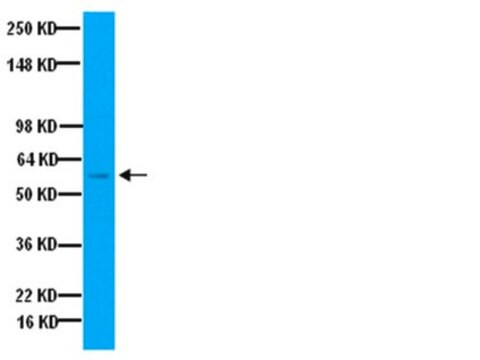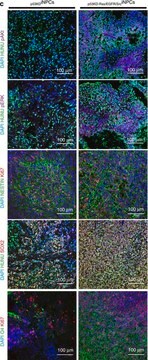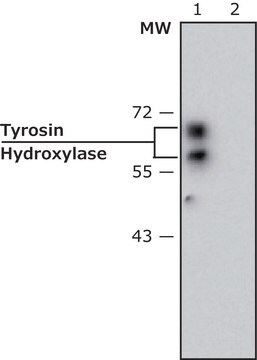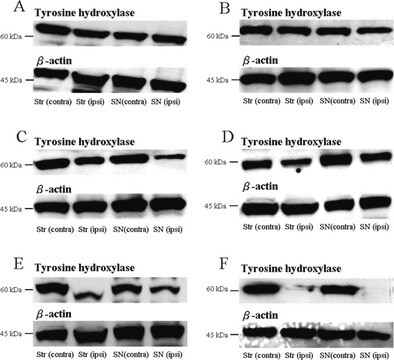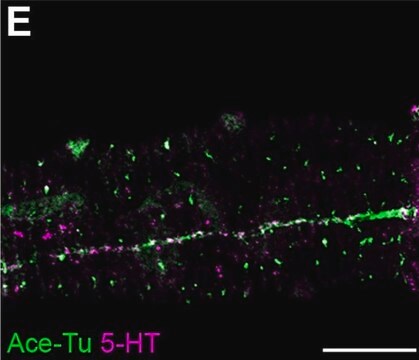657012
Anti-Tyrosine Hydroxylase Rabbit pAb
liquid, Calbiochem®
Synonym(s):
Anti-Tyrosine Hydroxylase Antibody
Sign Into View Organizational & Contract Pricing
All Photos(1)
About This Item
UNSPSC Code:
12352203
NACRES:
NA.41
Recommended Products
biological source
rabbit
Quality Level
antibody form
purified antibody
antibody product type
primary antibodies
clone
polyclonal
form
liquid
does not contain
preservative
species reactivity (predicted by homology)
all
manufacturer/tradename
Calbiochem®
storage condition
OK to freeze
avoid repeated freeze/thaw cycles
isotype
IgG
shipped in
wet ice
storage temp.
−70°C
target post-translational modification
unmodified
General description
Affinity purified rabbit polyclonal antibody. Recognizes the ~60 kDa tyrosine hydroxylase protein.
Recognizes the ~60 kDa tyrosine hydroxylase protein in okadaic acid-treated PC12 cells.
This Anti-Tyrosine Hydroxylase Rabbit pAb is validated for use in Dot Blot, Immunoblotting, Immunofluorescence, Frozen Sections for the detection of Tyrosine Hydroxylase.
Immunogen
Rat
purified, SDS-denatured rat pheochromocytoma tyrosine hydroxylase
Application
Dot Blot (1:1000)
Immunoblotting (1:1000)
Immunofluorescence (1:1000)
Frozen Sections (1:1000; see application references)
Immunoblotting (1:1000)
Immunofluorescence (1:1000)
Frozen Sections (1:1000; see application references)
Warning
Toxicity: Standard Handling (A)
Physical form
In 150 mM NaCl, 10 mM HEPES, 50% glycerol, 0.01% BSA, pH 7.5.
Reconstitution
Following initial thaw, aliquot and freeze (-70°C).
Legal Information
CALBIOCHEM is a registered trademark of Merck KGaA, Darmstadt, Germany
Not finding the right product?
Try our Product Selector Tool.
recommended
Storage Class Code
10 - Combustible liquids
WGK
WGK 1
Certificates of Analysis (COA)
Search for Certificates of Analysis (COA) by entering the products Lot/Batch Number. Lot and Batch Numbers can be found on a product’s label following the words ‘Lot’ or ‘Batch’.
Already Own This Product?
Find documentation for the products that you have recently purchased in the Document Library.
Naoya Kataoka et al.
Biochimica et biophysica acta. Molecular basis of disease, 1866(7), 165762-165762 (2020-03-18)
Brown adipose tissue (BAT) plays a critical role in lipid metabolism and may protect from hyperlipidemia; however, its beneficial effect appears to depend on the ambient temperature of the environment. In this study, we investigated the effects of uncoupling protein
Kanako Otomo et al.
Nature communications, 11(1), 6286-6286 (2020-12-10)
The in vivo firing patterns of ventral midbrain dopamine neurons are controlled by afferent and intrinsic activity to generate sensory cue and prediction error signals that are essential for reward-based learning. Given the absence of in vivo intracellular recordings during
Ximena I Salinas-Hernández et al.
eLife, 7 (2018-11-14)
Extinction of fear responses is critical for adaptive behavior and deficits in this form of safety learning are hallmark of anxiety disorders. However, the neuronal mechanisms that initiate extinction learning are largely unknown. Here we show, using single-unit electrophysiology and
Jingjing Sherry Wu et al.
The Journal of comparative neurology, 526(3), 425-438 (2017-10-22)
Type II spiral ganglion neurons (SGNs) are small caliber, unmyelinated afferents that extend dendritic arbors hundreds of microns along the cochlear spiral, contacting many outer hair cells (OHCs). Despite these many contacts, type II afferents are insensitive to sound and
Saurabh Khasnavis et al.
The Journal of biological chemistry, 288(29), 20843-20855 (2013-06-08)
Although Parkinson disease (PD) is a progressive neurodegenerative disorder, available animal models do not exhibit irreversible neurodegeneration, and this is a major obstacle in finding out an effective drug against this disease. Here we delineate a new irreversible model to
Our team of scientists has experience in all areas of research including Life Science, Material Science, Chemical Synthesis, Chromatography, Analytical and many others.
Contact Technical Service
